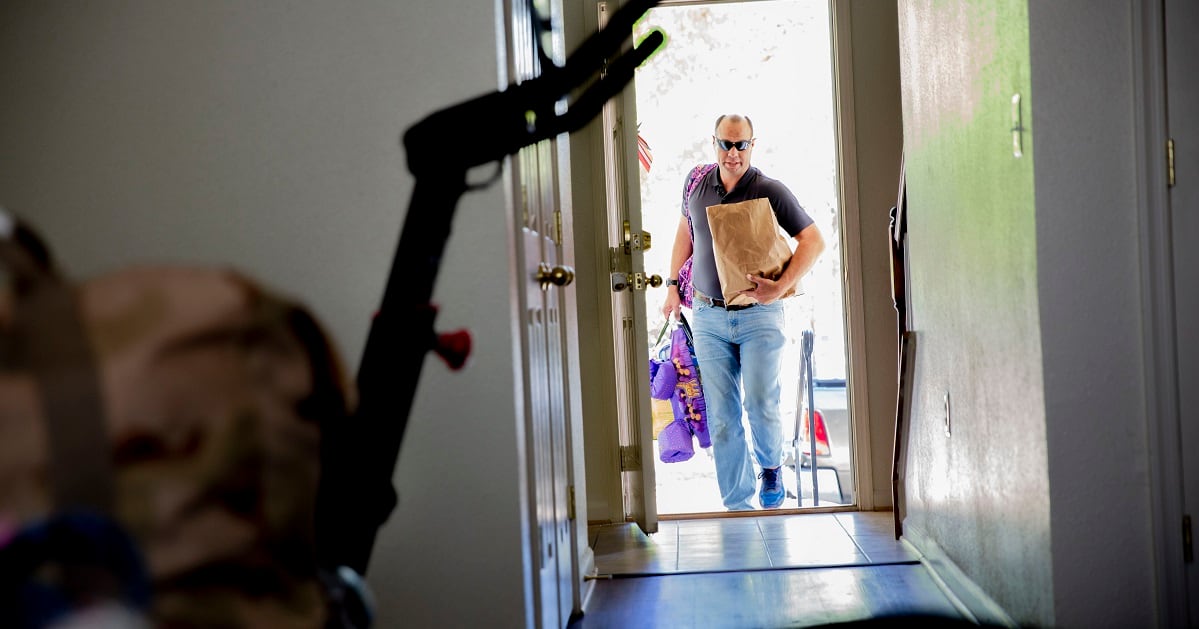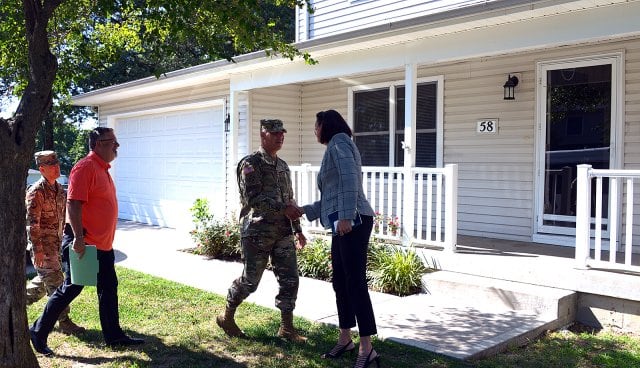If you’re a resident of military housing wondering when you’ll see your tenant bill of rights, there’s no answer.
Defense Department and military department leaders are still working on the tenant bill of rights and other initiatives that were included in the defense authorization act signed into law in December, according to DoD spokesman Chuck Prichard. “None of the details of their work are ready for release.”
Nearly two months after the bill was signed into law, “we have yet to hear word on when we will see a final tenant bill of rights,” said Eryn Wagnon, director of government relations for the Military Officers Association of America. “For all the momentum on this important issue generated by Congress, it is frustrating to know the process is lacking timeliness and transparency.
It’s been a year since military spouses first testified before lawmakers about black mold growing out of the walls, rodents, and water leaks in their family housing, and their frustration dealing with landlords and the military to get it fixed. A few weeks after that hearing, the service secretaries announced they were drafting a tenant bill of rights, which would, among other things, allow for the tenant’s rent to be withheld from the landlord while the resident’s dispute is being heard by a neutral decision maker. That rent is generally the service member’s Basic Allowance for Housing.
The tenant bill of rights was ready last fall; the service secretaries testified before the Senate in December that they were awaiting final passage of the authorization law, in order to make any changes before the final product.
The law makes sweeping changes in the military housing privatization programs.
RELATED

The services have been in discussions with the private companies for months about the issues and possible fixes, and have been doing parallel planning waiting for the law to be finalized. The Army announced that all the service secretaries met with executives of seven companies that operate privatized housing on military bases on Wednesday, to discuss implementation of the dispute resolution process, development of a common lease agreement, move-in, move-out procedures, and the public availability of home-maintenance histories. Information was not available at press time on timelines for these initiatives.
At least one military leader has said he doesn’t want to give military families false expectations about what the tenant bill of rights will achieve. In an interview with Military Times last fall, Army Gen. Gus Perna said he doesn’t want service members and family members to have the wrong impression “that we’re going to publish this [tenant bill of rights] and all of a sudden it’s going to be Disney World. It’s the foundation that we reference in our execution to achieve our goals.”
Perna, who is commanding general of Army Materiel Command, was tasked last year with by Army leaders with the mission of fixing the Army’s privatized housing problems.
RELATED

Under the new provisions in the law, the tenant bill of rights must include minimum rights for residents of military housing units, including the rights to:
*a housing unit and community that meet minimum health and environmental standards;
*a housing unit that has working fixtures, appliances, and utilities; and a community with well-maintained common areas and amenity spaces;
*prompt and professional maintenance and repair, and to be informed of the time required. If such repairs are necessary to ensure the habitability of the unit, the tenant must be relocated into suitable lodging or other housing until repairs are completed, at no cost to the tenant;
*the ability to report inadequate housing standards or deficits of the housing unit to the landlord, the chain of command and the housing management office without fear of reprisal or retaliation. The law outlines six examples such as interfering with the tenant’s career, harassment, unlawfully raising the rent or trying to evict the tenant, interfering with the tenant’s right to privacy and refusing to honor the terms of the lease.
*a dispute resolution process if other methods are exhausted;
*the withholding of the Basic Allowance for Housing payments from the landlord, to be held in escrow, until the dispute is resolved;
*the maintenance history of the prospective housing unit before signing a lease;
*a written lease with clearly defined rental terms;
*a “plain-language” briefing before signing a lease and 30 days after moving in, by housing office personnel on all rights and responsibilities of the tenant;
*enough time to prepare for and be present for move-in and move-out inspections;
*access to a military tenant advocate through the housing management office of the installation;
*property management services that meet or exceed industry standards and are done by professional, trained, responsive and courteous employees;
*multiple, convenient ways to communicate directly with the landlord maintenance staff, and to receive consistently honest and responsive communications from them;
*access to an electronic work order system to request maintenance or repairs and to track the progress of the work;
*advice from military legal assistance on procedures for resolving disputes and for filing claims against the landlord;
*advance notice of any entrance into the housing unit by the landlord, housing staff or chain of command, except in the case of emergency or abandonment of the unit;
*no non-refundable fees or withholding of rent credits.
The Fiscal 2020 National Defense Authorization Act doesn’t specify a timeline for the completion of the common tenant bill of rights. However, in a related section, the law describes a deadline of March 1 for the Secretary of Defense to submit a list to the congressional defense committees of any landlords who didn’t agree to certain requirements in the law.
The law makes sweeping changes in the housing privatization program that could affect agreements made between the services and the private companies entered into a decade or more ago, and the private companies must agree to the changes.
The law requires DoD and the services to consider any of those companies’ lack of agreement as military officials enter into or renew any future contracts for privatized military housing.
Karen has covered military families, quality of life and consumer issues for Military Times for more than 30 years, and is co-author of a chapter on media coverage of military families in the book "A Battle Plan for Supporting Military Families." She previously worked for newspapers in Guam, Norfolk, Jacksonville, Fla., and Athens, Ga.




